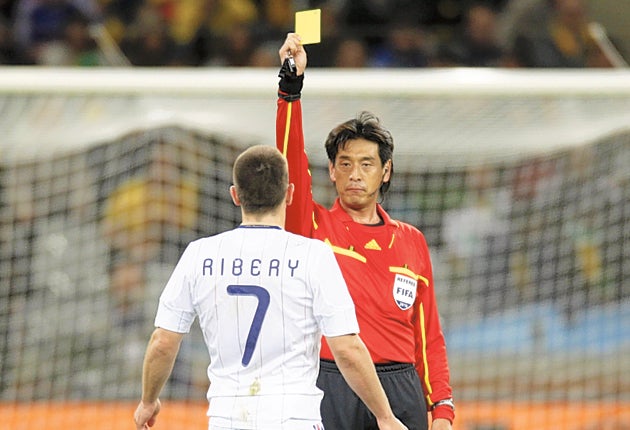On the side of a flyover in Cape Town, as the motorway slithers down to one of the world's great waterfronts, is an electronic tally of the number of goals scored in what in South Africa they refer to as the "Mother City". The day after the opening game at Green Point, it was still reading zero.
When he came to explain why for the third successive time a French World Cup campaign had started unconvincingly, Raymond Domenech's microphone failed to work, although the journalists in the stadium's press room had a fair idea of what the France manager was going to say. As his team limped towards the World Cup, he developed a mantra. "I was pleased with the movement, the spirit and organisation," he would say, as repetitively as Sven Goran Eriksson used to mouth the words "First half good, second half not so good" in his time with England.
Before the tournament began, England's route seemed to lead directly towards a meeting with the French in Cape Town. On Friday night's evidence it's not a quarter-final they would fear.
France, however, have passed this way before. Their last World Cup began with a goalless stalemate against Switzerland and continued with a 1-1 draw against South Korea. In their final group match, in Cologne, they were being held 0-0 by Togo until the old hands, Patrick Vieira and Thierry Henry, came to their rescue. Vieira has gone – when Domenech decided that the man who had anchored the French midfield through three World Cups did not merit a place in South Africa, he neglected to tell him – and Henry, much to the annoyance of some of his team-mates, began on the bench.
So, too, did Florent Malouda, though the Chelsea forward denied it was because of a row with stand-in captain Patrice Evra over some overly aggressive tackling on the practice pitches at Knysna that infuriated the Manchester United defender. "I committed two fouls and everyone became a little upset," was how Malouda described the incident. "But I wasn't left out because of that. The manager wanted a second holding midfielder against Uruguay. It was his choice and you have to accept it."
Domenech's preference for Abou Diaby was an inspired decision on an uninspired evening. Arsène Wenger, who watched as a commentator, said there were similarities between Diaby and Vieira, and they did not seem too fanciful. One pass summed up France's evening; a long ball from Diaby that seemed certain to set up Sidney Govou until Nicolas Anelka intercepted it and promptly found himself offside.
Domenech's two marquee players, Anelka and Franck Ribéry, floundered. The Chelsea striker proved unable to link up with his midfield while Ribéry produced one flash of early brilliance that all but presented Govou with a gaping goal, then disappeared.
After the scandal over underage call-girls that enveloped him as his season with Bayern Munich reached its climax and the spiteful tackle on Lisandro that cost him his place in the European Cup final, there are few who need this World Cup more than Ribéry and few who possess his talent to impose himself on it. Ribéry, the man who drove France to Berlin past Spain, Brazil and Portugal in 2006, came late to football. At the age when Lionel Messi was winning the European Cup, he was helping out his dad as a builder in Boulogne. There may not be a third World Cup for him; and some swift rebuilding is what France require now.
Subscribe to Independent Premium to bookmark this article
Want to bookmark your favourite articles and stories to read or reference later? Start your Independent Premium subscription today.


Join our commenting forum
Join thought-provoking conversations, follow other Independent readers and see their replies